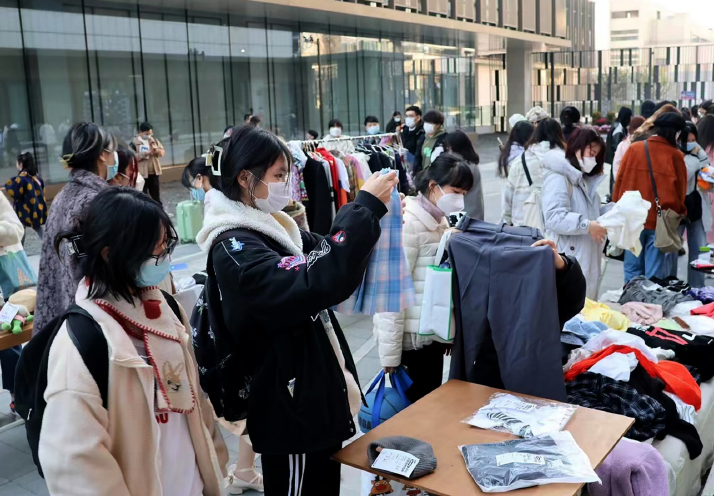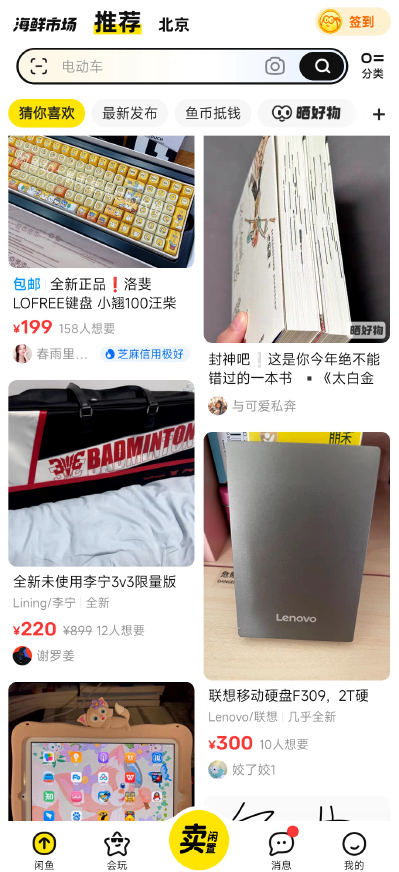| Business |
| Secondhand market gains traction among young Chinese | |
|
|
 A fair where people can swap their used goods in full swing in Wuhan, Hubei Province, in January (CNSPHOTO)
Recently, Zhong Xiaoli, a 29-year-old white-collar in Beijing, sold her 35th item on Xianyu (literally translated as Idle Fish), an online platform for secondhand items owned by Chinese tech giant Alibaba Group. Since she first started using the app seven years ago, she has earned more than 3,500 yuan ($479) from the sale of items she had used or left unused, ranging from cosmetics and clothing to electronic devices and home appliances. The most expensive item she ever sold was a camera—which she'd originally purchased on the app. "I had bought it for 800 yuan ($109) and sold it for more than 900 yuan ($123) more than a year later," Zhong told Beijing Review. "The 'trade' was both a surprise and a lot of fun." To date, Xianyu has more than 500 million users. According to the platform's data released in late May, the number of products on the platform exceeded 1 billion, and more than 1 billion secondhand items are sold on the app every year. The size of China's secondhand goods market has grown rapidly from about 300 billion yuan ($41 billion) in 2015 to more than 1 trillion yuan ($137 billion) in 2020, and is expected to triple by 2025, according to a report released in September 2021. The report was jointly published by American consulting firm Frost & Sullivan, Tsinghua University's Institute of Energy, Environment and Economy, and Zhuanzhuan Group, the operator of another Chinese secondhand marketplace. The report also pointed out that with the continuous change in consumer attitudes and the deepening of environmental protection awareness in China, the trade of used goods has evolved from a relatively niche money-saving option to a trendy lifestyle choice especially favored by young consumers born in the 1980s and 90s.  Screenshot of online secondhand market platform Xianyu (literally translated as Idle Fish)
Cheap or chic? Most of the items Zhong traded were brand new and sold for a quarter to a fifth of the original price. "In the first few years when I just started to work and earn money, I used to go on shopping sprees, especially on online e-commerce platforms such as Taobao (Alibaba's ubiquitous shopping app) and during trips to tax-free shops," Zhong said. "Now I'm more sober in terms of consumption and try to maintain a minimalist lifestyle." Recently, hashtags such as "Why are young Chinese becoming 'cheap'?" and "Young Chinese are becoming more rational consumers" were frequently searched topics on popular domestic microblogging platform Weibo. A report released by market consultancy iiMedia Research on Chinese consumption in 2022 shows that those born between 1990 and 2009 tend to be frugal. Turning to secondhand goods is one of their go-to spending options, along with looking for discounts at supermarkets or just enjoying window-shopping. "It's about refusing to fall into a consumption trap created by companies," Zhong explained. For some people, the boom in the secondhand market is a sign that the impulse to consume is waning. For others, it is also partly due to the development of e-commerce, where sellers offer higher discounts that encourage consumers to buy their products in bulk, especially during online shopping festivals such as 618, which started life as an anniversary sale commemorating the founding of major online retailer JD.com on June 18, and Double 11, similar to Black Friday in the United States, leading to a large number of surplus goods being bought, stored at home and eventually resold. To market their goods, people post messages explaining why they want to sell these items, in addition to describing the products. For example, "My boyfriend gave me this necklace, but now he's my ex" or "I was going to give this perfume to my girlfriend, but we've broken up." Some items are marked as unused year-end prizes from employers. Besides being a platform to save money or get rid of unnecessary goods, the secondhand market has also become a channel for younger generations to meet their fashion needs. In addition to selling luxury items such as designer watches, jewelry and coveted handbags, some online platforms dedicated to secondhand luxury goods even offer authentication services. Then there are those platforms that focus on one particular type of product, such as Duozhuayu, which sells used books, and Fengniao.com, which sells cameras. Wang Cheng, a Shanghai-based shutterbug, has bought more than 15 CCD cameras from secondhand stores. Taking photos with them is his hobby. Introduced in the 1970s and gradually replaced by newer generations of cameras since 2010, CCD cameras, or charged-coupled device cameras, which are no longer in production, are attracting more and more people thanks to their accessorizing powers and the unique retro-style images they create. The once-outdated camera today has found its way into young hearts through the celebrity effect—some movie stars and influencers have shared their use of the camera, making it a bonafide fashion icon. "They can create photos with better textures—outdoing any smartphone camera," Wang said. But with rising popularity comes a rising price tag. Wang said that in the past, one could buy a CCD camera for less than 100 yuan ($13.7) on the secondhand market, whereas now the same model as the ones owned by celebrities can be sold for more than 1,000 yuan ($137). Knowing your rights Although secondhand platforms can offer consumers a bang for their buck, there are risks involved. "I once bought one camera with obvious defects, and the seller wouldn't allow me to return it and get a refund. It took me days to defend my consumer rights on the platform. Although it was eventually returned, the process was tiring and distressing," Wang said. "We need to be careful when buying secondhand goods." Not only do consumers need to be careful when buying secondhand goods, sellers, too, may face a host of hiccups. For example, in July, a woman surnamed Bao wanted to sell two Starbucks gift cards with a total face value of 400 yuan ($55) on a secondhand trading platform at the price of 380 yuan ($52). A buyer contacted her and said he wanted to purchase them. The platform then displayed a message saying, "The buyer has already made the purchase." Bao thought it meant the buyer had already paid, so she gave the buyer the password to unlock the cards. However, she later found out that the buyer had only placed an order but had not made any payment. Lu Laiming, a professor of law at Beijing Technology and Business University, said at present, online transactions of secondhand goods in China are mostly defined as "non-business activities." However, e-commerce laws and regulations mainly focus on business activities, with less regulation on non-business activities. "Some businesspeople operate on secondhand platforms under the guise of disposing of items, with the aim of dodging regulatory restrictions for first-hand e-commerce platforms," he told newspaper China Consumer News. But the essence of secondhand e-commerce transactions is still the sale of goods through online platforms. The small transaction volume of individual sellers does not mean that those people can go beyond the law, and their behavior should also be regulated by the laws and regulations, such as the E-Commerce Law and the Law on the Protection of Consumer Rights and Interests, said Chen Yinjiang, Deputy Secretary General of the Consumer Rights Protection Law Research Association of the China Law Society. "If the rights and interests of buyers or sellers are violated, they should collect evidence in a timely manner and negotiate with the platform to find a solution. If the negotiation fails, they can file a complaint with the market regulator or the public security department," Chen told China Consumer News. (Print Edition Title: Trash to Treasure) Copyedited by Elsbeth van Paridon Comments to luyan@cicgamericas.com |
|
||||||||||||||||||||||||||||||
|